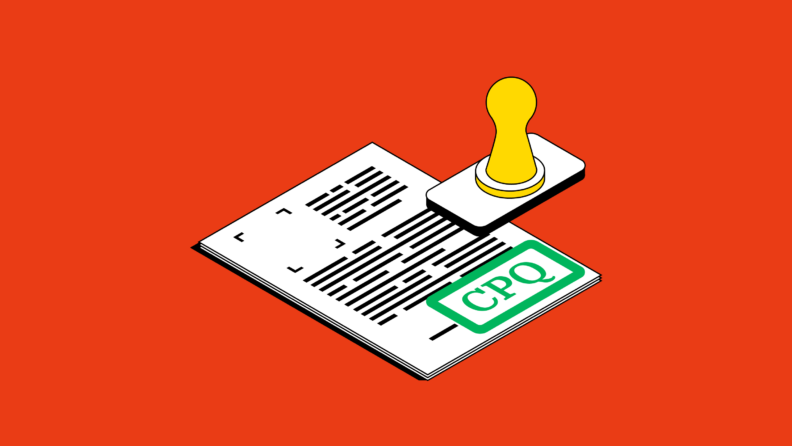Salesforce controls 23% of the CRM software market, putting it way ahead of Oracle, SAP, Adobe, and Microsoft. But what does that mean for you? Well, if you’re skilled in using Salesforce to automate CRM workflows and improve customer relationships, you can use your know-how to launch a lucrative career. Or, if you're a CRO or other executive and have someone on your team with experience using the Salesforce CPQ platform, getting them certified could mean better custom quotes and flows for your business.
From a business perspective, having a certified Salesforce CPQ specialist on staff is a real boon. With the right person on your team, you can use Salesforce to automate more functions than ever, boosting efficiency and making it easier to deliver excellent service.
At The RevOps Team, we love helping businesses of all sizes deliver predictable growth at scale. Use this exam guide to brush up on CPQ concepts or determine if your company should pay for employees to get certified.
What Is the Salesforce CPQ Specialist Certification?
If it’s been a while since you set up Salesforce, here’s a bit of a refresher. CPQ stands for configure, price, quote. As part of the Salesforce platform, the CPQ tool makes it easy to create custom quotes for any product.
The Salesforce CPQ credential shows that you have the knowledge and skills needed to design, build, and implement custom flows in the CPQ tool. To become a Salesforce CPQ Specialist, you must pass an in-depth certification exam. Although the CPQ is one of the most difficult Salesforce exams, you can use practice tests and other tools to pass with flying colors.
Another bit of good news is that you only need a score of 65% to pass the exam. This gives you a little bit of breathing room, as you can get several questions wrong and still walk away with your CPQ credential.
Who Is the Salesforce CPQ Specialist Certification For?
The Salesforce CPQ specialist certification is designed for anyone with hands-on experience using the Salesforce CPQ platform and troubleshooting basic issues. Although there’s no minimum experience requirement, we recommend you have at least 1 year of CPQ use under your belt. This gives you plenty of time to experiment with the platform and gain more confidence in your troubleshooting and automation abilities.
Before you register for the Salesforce certified CPQ specialist exam, you should feel comfortable with these fundamentals:
- Advanced approvals
- Discount schedules
- Price rules configuration
- Product rules
- CPQ admin procedures
- Troubleshooting pricing issues
- Ordering and contracting within the CPQ package
- CPQ implementation
- User permissions
Per Trailhead, the Salesforce learning platform, you don’t have to worry about CPQ plug-ins, legacy data handling, integration with third-party applications, or other advanced functions.
If you’re a CRO looking to build a team of Salesforce ninjas, the CPQ certification is best for people who already have extensive experience with sales, information technology, or some combination of the two. We’d advise against having a complete beginner sit for the exam, as they’re likely to fail, leaving you with little to no return on your investment.
Generally, the CPQ cert is appropriate for product managers, pricing managers, IT experts, sales operations employees, technical architects, and implementation consultants. If your company uses job titles that don’t line up with industry standards, take a look at each employee’s job description to verify they have extensive experience using the CPQ platform.
A Breakdown Of Topics By Importance
The CPQ exam has 65 multiple-choice questions, but only 60 of them count toward your score. You won’t know which questions are scored, so use practice tests, study guides, and other tools to brush up on your Salesforce knowledge. When you take the exam, you’ll encounter seven modules, all with different weights.
1. Products, product selection, and bundle configuration (35%)
As you can probably guess, this section focuses on products and bundles. Each question is scenario-based, which means you need to know more than basic definitions and use cases. In fact, the question may include background information about a business, such as a selling process or product catalog.
Based on the information you provided, you may be asked to set up a product bundle, identify appropriate configuration attributes, set up subscription products, identify applicable search filters, or create option constraints.
2. CPQ platform (23%)
Questions in this section help determine how comfortable you are with handling unexpected results, adjusting user interfaces, updating permissions, or using localization mechanisms. You may even have to predict what happens during the contracting process based on a finalized quote.
3. Pricing (16%)
Pricing questions account for 16% of your score, so it’s helpful to brush up on pricing models, pricing methods, block pricing, price dimensions, multicurrency pricing, and investigation paths. Be prepared to base your answers on the business requirements provided.
4. Orders, contracts, amendments, and renewals (15%)
For this section, you should be able to read a scenario and determine when to use the assets, contracts, subscriptions, and orders functions to meet a company’s needs. You should also know how to generate renewal and amendment quotes, generate orders, create contracts, and perform other relevant tasks.
5. Quote templates (7%)
Since this section only accounts for 7% of your score, there aren’t many questions on quote templates. However, you should be able to set up a template that meets the requirements described in a business scenario.
6. Approvals (4%)
Last but not least, you need to demonstrate your ability to use advanced approvals in Salesforce CPQ. With advanced approvals, it’s possible for the person in charge of reviewing quotes to accept or reject them by email instead of having to open Salesforce and view each quote individually.
Study And Exam Strategy
Now that you know what’s on the CPQ exam, it’s time to start studying. As we mentioned earlier, this credential is for people who already have extensive experience using the CPQ platform. If you’ve only been using it for a few months, hold off on registering. It’s better to wait a while than to pay for the exam and fall short of a passing score.
If you already have plenty of experience, the next step is to buy test prep materials or enroll in an online course to increase your knowledge. Trailhead offers a program called Prepare for Your Salesforce CPQ Specialist Credential on its website. You’ll gain access to more than 15 hours of in-depth training, helping you develop the skills you need to pass the exam.
Another option is to use a site like Udemy or LinkedIn Learning to find low-cost training materials. Once you’re confident in your knowledge and skills, you can start taking practice tests. Each test gives you an opportunity to adjust your study plan, so take as many as possible to determine your strengths and weaknesses.
Every time you take a practice exam, try to mimic official testing conditions as closely as possible. Sit at a desk with the door closed, turn off Spotify, and concentrate on understanding the scenarios. The CPQ exam is timed, so you should also practice working under time constraints. If you practice without a timer, you may run out of time before you answer every question on the real exam.
More Articles
Exam Tips And Tricks
To improve your chances of passing, read each question at least twice. The CPQ is scenario-based, so you won’t see questions like “What is the definition of an app builder?” Instead, you’ll see things like “The Salesforce admin at ABC Company is creating permissions for members of the sales team. For which objects do team members need read, create, edit, and delete permissions?”
Notice that the question mentions the sales team. Sales professionals don’t set price conditions or discount tiers, but they do provide quotes to customers. If only one of the answer choices mentions quotes, you’ll know it’s the correct one. Reading carefully helps you pick up on little clues that can help you narrow down your options.
You have just 105 minutes to answer the 65 questions on the CPQ certification exam. That means you have about 1.6 minutes to read a question and pick an answer. You can’t afford to spend 3 or 4 minutes on the early questions, or you won’t have enough time to finish the exam. This is why it’s so important to practice with a timer beforehand.
Ace The CPQ Specialist Exam
Obtaining the Salesforce CPQ certification can help you qualify for new job opportunities, get a promotion at your current job, or increase your salary. Everyone here at The RevOps Team is cheering you on as you learn more about Salesforce and put together your study plan. While you're at it, learn more about the platform and how it operates in our article 40 Customers that Use Salesforce as their Preferred CRM.
As you prep for the exam, read more about combining technology with strategy to create scalable growth. Subscribe to our newsletter for valuable insights from industry experts.


